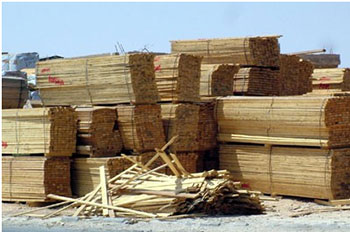
DAMASCUS, (ST) – The government has worked hard in the past years to create new free zones in some governorates, develop, expand the existing areas, provide a well-developed infrastructure and modernize the laws to keep up with legislations governing the free zones in the world and be able to attract local and foreign investments.
The government also is keen, through its own procedures in the free zones, to ensure investment system that allows entering and leaving of products to these areas without any customs duties.
These areas form basic leverages and support to the national economic growth of many countries which explains that most of the conventions and economic blocs which states seek to set up among themselves.
These areas are granted, according to Deputy Minister of Economy and Foreign Trade, Dr. Hayan Salman, more preferential advantages, including exemption all products from customs duties, even if a part of them is directed towards the domestic market.
“The free zones can increase exports of technological content and reduce dependence on imports, which leads to improve trade balance, secure foreign exchange, increase cash reserves, improve the balance of payments and treasury revenues and customs duties collected on foreign inputs in the productivity process in addition to running more of the labor force in both of these areas or the surrounding areas, create jobs directly and indirectly, reduce the unemployment rate, increase in per capita income and economic efficiency,” Dr. Salman said.
“The free zones play a major role in increasing business investment and resettling of the national capital and enhancing the competitiveness of goods produced nationally, taking into account that the ratio of added value higher or equal to 40 percent of the value of the item according to the r Arab Free Trade Agreement, which entered into force at the beginning of 2005,” Dr. Salman added.
According to a report about the results of the work of the General Establishment of Free Zones since the beginning of 2012 until last September of the same year, the value of goods entering and leaving is estimated at 51 billion which represents a retreat from the same period of 2011 and reached 38 percent, which had recorded 118 billion Syrian Pounds
The report shows that the capital invested in this period amounted to $ 712 million with a decline of 11 percent and the number of investors reached to 981with a retreat of 13 percent and the number of foreign companies reached to 76 companies with a decline 5.8 percent while the capital invested for foreign companies amounted $ 88 million, a retreat of 29 percent from the same period in 2011.
The report points out that the decline of these investments was the result of effects of the crisis experienced by the country and the sanctions imposed on it despite the efforts being exerted by the Ministry of Economy in providing facilities and exemptions for investors and exempting investors from interest and penalties.
The General Establishment of Free Zones called for the joint committees to inform businessmen and investors who have a desire to invest in Syria in general or to establish private free zones managed by the investor himself that these special zones have full exemption of taxes and fees in addition to the free transfer of capital and profits out of Syria and vice versa with the provision of freedom of technical and specialized labor recruitment, and granting this products in this region a certificate of Syrian origin or an origin of free zone for the manufactured products.
According to Dr. Salman, the expansion in establishing new free zones requires the involvement of the private national sector such as chambers of industry and commerce and making consultations with countries that are linked with economic and trade agreements, such as Iraq and the countries of the Customs Union, Russia, Belarus, Kazakhstan, Iran and Latin American countries.
The Deputy Minister pointed out the importance of developing regulations relating to free zones and increasing the areas specialized for this purpose , particularly in the less developed regions, expanding its activities to include aspects of economic work of industry, agriculture and services to turn these areas into centers that can be supportive of economic takeoff and improving Syrian economic indicators.
He also stressed the need to increase investment rates particularly industrial investments through setting up developed industrial groups, increasing demand for Syrian raw materials and activating internal demand for goods and services and converting them to industrial goods.
Sh. Kh.

